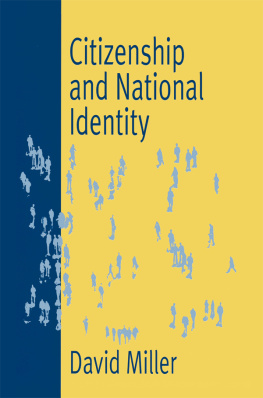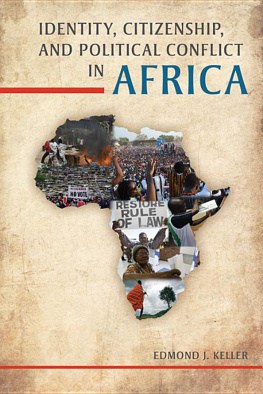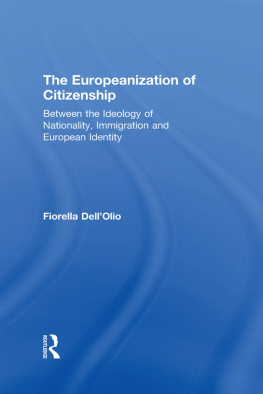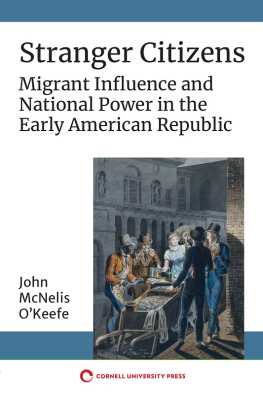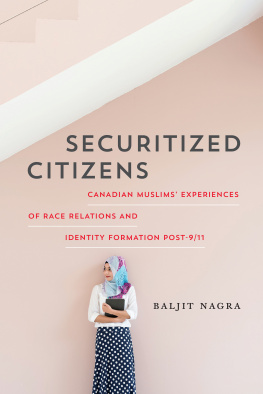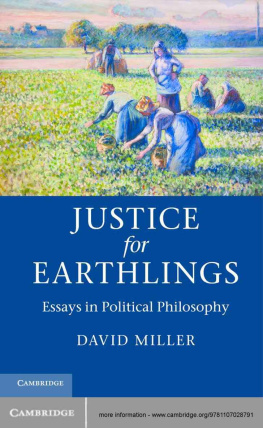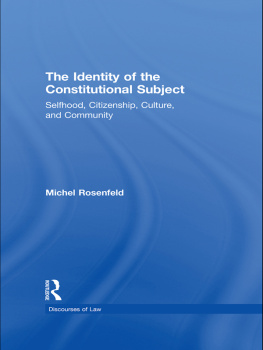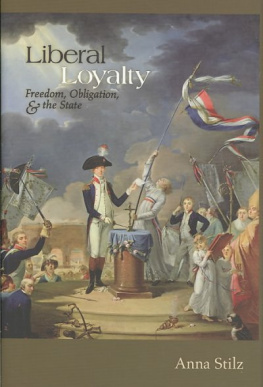The right of David Miller to be identified as author of this work has been asserted in accordance with the Copyright, Designs and Patents Act 1988.
First published in 2000 by Polity Press in association with Blackwell Publishers Ltd.
All rights reserved. Except for the quotation of short passages for the purposes of criticism and review, no part of this publication may be reproduced, stored in a retrieval system, or transmitted, in any form or by any means, electronic, mechanical, photocopying, recording or otherwise, without the prior permission of the publisher.
Except in the United States of America, this book is sold subject to the condition that it shall not, by way of trade or otherwise, be lent, re-sold, hired out, or otherwise circulated without the publishers prior consent in any form of binding or cover other than that in which it is published and without a similar condition including this condition being imposed on the subsequent purchaser.
Miller, David.
Citizenship and national identity/David Miller.
p. cm.
Includes bibliographical references and index.
1. Citizenship. 2. Nationalism. I. Title
A catalogue record for this book is available from the British Library.
Typeset in 10 on 12 pt Sabon by Kolam Information Services Pvt. Ltd., Pondicherry, India
This book is printed on acid-free paper.
Acknowledgements
I should like to thank the editors and publishers of the following essays for permission to reprint them in this book.
Deliberative Democracy and Social Choice, Political Studies, 40 (1992), Special Issue on Prospects for Democracy, 5467.
In Defence of Nationality, Journal of Applied Philosophy, 10 (1993), 316.
Citizenship and Pluralism, Political Studies, 43 (1995), 43250.
Group Identities, National Identities and Democratic Politics in J. Horton and S. Mendus (eds), Toleration, Identity and Difference (London, Macmillan, 1999).
Bounded Citizenship in K. Hutchings and R. Dannreuther (eds), Cosmopolitan Citizenship (London, Macmillan, 1999).
Communitarianism: Left, Right and Centre in D. Avnon and A. de-Shalit (eds), Liberalism and its Practice (London, Routledge, 1999).
Secession and the Principle of Nationality in J. Couture, K. Nielsen and M. Seymour (eds), Rethinking Nationalism (Calgary, University of Calgary Press, 1998) (Canadian Journal of Philosophy, Supplementary Volume 22).
Nationality in Divided Societies in A. Gagnon and J. Tully (eds), Struggles for Recognition in Multinational Societies (Cambridge, Cambridge University Press, 2000).
Introduction
The essays collected in this book were all written during the last ten years, and together represent my attempt to throw some light on two central issues: what citizenship can mean in todays world, and whether nationality remains a defensible principle around which to organize our politics. I regard these issues as closely connected, in the sense that the form of citizenship that I advocate, which I call republican, is feasible only where it can call upon the ethical resources of a national community. So the defence of republican citizenship and the defence of nationality are closely linked, and I therefore believe that the essays included here, although composed for separate occasions, set out a coherent political theory.
Politically speaking, the position from which they are written is broadly social democratic. A concern for social justice, and the conditions under which it can be achieved, is never far below the surface, and indeed during the period in question I have been working in parallel on a restatement of my views on that topic, which has now appeared in book form as Principles of Social Justice (Cambridge, Mass., Harvard University Press, 1999). But the 1990s have been a difficult decade for those who share my general stance (the spate of electoral victories by social-democratic parties in Europe and elsewhere notwithstanding). Three developments in particular have appeared to threaten the idea of social justice pursued by democratic means within national boundaries, which I believe stands at the heart of social democracy as a political project.
The first of these is economic and cultural globalization the set of processes which, it is argued, entail that the state is losing the capacity to control economic activity within its borders, and also the capacity to determine the cultural make-up of its citizens. Free international movement of both capital and labour means that all states are forced to pursue essentially similar economic policies internally if they are not to scare away investors or lose skilled labour to other states, while flows of information of all kinds across borders mean that citizens everywhere are increasingly exposed to the same barrage of cultural messages they watch the same television shows, listen to the same news programmes, see the same advertisements, buy the same commodities and so on. As a result of all this, the argument goes, the power of the state is ebbing away, and it matters less to individual citizens what character their state has, or where its boundaries are drawn. So the effect of globalization is on the one hand to make social justice as it is usually understood harder to pursue, and on the other to make traditional concerns about citizenship and nationality increasingly marginal to the lives of ordinary people.
The second tendency runs in a sense directly counter to the first, but it too has disturbing implications for the nation-state in its traditional form. This is the emergence, in many parts of the globe, of sub-state nationalisms that challenge the legitimacy of existing states. Whether the challenge is violent or peaceful, the claim made is that established states are unable to satisfy the interests and the cultural demands of smaller, more local communities. Unfortunately, however, these claims may be very difficult to meet, not least because of territorial disputes between different national groups of the kind we have witnessed in former Yugoslavia, Sri Lanka, Israel and many other places. So the problem here is not that people are becoming economically or culturally cosmopolitan, but that they are engaging in forms of politics (and political violence) that bring to mind Isaiah Berlins image of nationalism as a bent twig that when released lashes back uncontrollably at those who are seen as the oppressors and tormentors of the minority nations.
The third tendency has something in common with each of the first two. This is the appearance, within liberal democracies, of new forms of identity politics, whereby groups formed on the basis of shared ethnicity, religion, gender or sexuality enter political arenas in search of recognition and a remoulding of citizenship so that it comes to reflect these more fractionalized forms of personal identity. The message appears to be that political identity does indeed matter in politics, but that the identities that count are not the old identities stemming from nationhood and common citizenship, but new, more fragmented identities that are often shared with others outside the boundaries of the state. So identity politics appears in part to reflect the transmission of different cultures across national borders, and in part to reflect the desire for stronger, more direct forms of political identity that sub-state nationalisms also embody.

